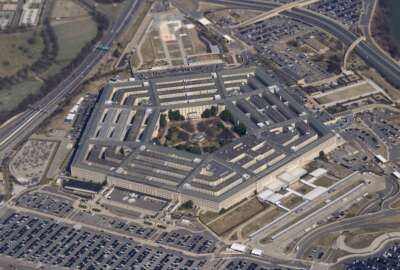The reason why the Air Force pulled the plug on a huge cyber contract may surprise you
Cyber companies were left holding the bag of bid and proposals costs to the tune of hundreds of thousands of dollars when the Air Force abruptly cancelled a huge...
The Air Force was 18 months into the Enterprise Cyber Capabilities acquisition and on the brink of making awards. The excitement over this potentially $5 billion multiple award indefinite delivery, indefinite quality contract among industry was a high as any opportunity on the street over the last few years.
With a few strokes on the keyboard on Sept. 19, the Air Combat Command terminated EC2.
The Air Force took the unusual step of pulling the plug on the entire acquisition for reasons that may make sense on the surface, but was baffling to long-time acquisition experts and especially to the vendors, who spent more than year and hundreds of thousands of dollars or more on proposals.
“While it is good that the requirement generated significant industry interest with over 250 proposals received, the established acquisition strategy and evaluation methodology were not suitable to result in a manageable number of prime contract awards. It is in neither the U.S. Air Force’s nor industry’s best interest to award far more prime contracts than the program and its supporting workforce can properly administer, and for which sufficient competitive opportunities are projected to provide fair opportunity to a significant number of prime contractors,” the Air Combat Command, which was running EC2, wrote in a notice on SAM.gov.
Agencies have cancelled procurements for a lack of competition. They have cancelled contracts because industry feedback made it clear the government wouldn’t be successful. And agencies have terminated acquisition efforts for an assortment of other reasons.
But long-time acquisition experts say they can’t remember a time when an agency cancelled an acquisition because there was too much interest.
“Clearly, there was insufficient market research conducted to understand how many contractors would propose, and how fully qualified they would be based on the selected source selection strategy,” said Mike Smith, former director of strategic sourcing at the Homeland Security Department and now executive vice president at GovConRx. “From my humble perspective, the Air Force should have foreseen a robust response to this requirement given the huge emphasis on cybersecurity across government and industry today. Additionally, true market research, and not just going through a process, would have told them to expect a large number of proposals, and as such a down-select process and more true discriminators would have been in order.”
A market research failure
Agencies are spending more time and resources on market research these days. The General Services Administration even offers a free tool, market research-as-a-service. Laura Stanton, GSA’s assistant commissioner for the Office of IT category in the Federal Acquisition Service, wrote in a July 31 blog post on MRAS that in three years, the service has conducted over 3,000 requests for information for customers, including more than 25% specifically for IT category special item numbers (SIN) on the GSA multiple award schedule. The top user of MRAS is the Air Force.
But this is more than a market research failure. While experts applauded the Air Force’s tough decision to pull the plug right before the award, the fact the ACC let EC2 go on through almost all the phases of an acquisition before realizing it wasn’t going to work is major breakdown.
A former Air Force official, who requested anonymity because they still do business with the Defense Department, said the entire acquisition strategy was problematic from the start.
ACC went with a self-scoring approach and let companies partner with each other multiple times so figuring out which team was better than another was too difficult.
“The big question is did they really red team how industry would respond to the solicitation?” the former official said. “If they had one-on-one meetings with some of the bidders or more directed discussions, they would’ve gotten feedback on their strategy. The acquisition offices that speak least with industry have the most challenges with procurements. They did hold an industry day, but those are one way discussions. If they did one-on-ones, they would’ve gotten better feedback about the solicitation and how industry would react.”
Greg Giddens, a former chief acquisition executive at the Department of Veterans Affairs and now a partner with Potomac Ridge Consulting, said cancelling a contract like this has negative impacts on both the agency and industry.
“It will make industry less inclined to invest in responding to future proposals and some in the government underestimate the expense that industry incurs to respond. For something like the acquisition, it could easily be in the millions for each company,” he said. “The biggest impact in cancelling an acquisition like this one where the requirements still exist is that the mission needs will not be met.”
Air Force had no other choice
Smith added it’s clear the Air Force will not reimburse industry for their costs and expenses.
“In cancelling this solicitation, the AF unilaterally decided to spread the B&P cost for this effort across all federal agencies,” he said.
The Air Combat Command spokesperson said the agency didn’t have a lot of options but to cancel the acquisition entirely once it realized the challenges ahead.
An ACC spokesperson said the evaluation and award methodology for the acquisition provided that an award would be made to each and all “qualifying offerors. The solicitation did not include a specific number of awards, and the source selection team did not have a set expectation.
“Alternative evaluation methodologies and the re-definition of ‘qualifying offerors’ were considered, and ACC Acquisition Management and Integration Center concluded that either would result in substantial changes to the EC2 solicitation. In accordance with FAR 15.206(e), if an amendment is proposed for issuance after offers have been received and that amendment ‘is so substantial as to exceed what prospective offerors reasonably could have anticipated, so that additional sources likely would have submitted offers had the substance of the amendment been known to them, the contracting officer shall cancel the original solicitation and issue a new one, regardless of the stage of the acquisition,’” the spokesperson said as the reason for a cancellation instead of modification.
Now that the Air Force ended EC2 after more than 18 months of planning, the need for cyber services doesn’t go away. The spokesperson said ACC is analyzing its next steps to meet enterprise cybersecurity needs.
“In the meantime, ACC AMIC will continue to solicit and award those requirements on an individual basis, either by issuing separate solicitations that will be posted on SAM.gov or by competing and/or placing orders under existing GSA, Defense Department and/or Air Force IDIQ contract vehicles,” the spokesperson said.
And this brings us all the back to the age-old discussion about why agencies believe they need their own multiple award contracts still. The Air Force’s short plan on is really a long-term solution for every agency who believes they need to go down their own path.
And the governmentwide solution to limiting or stopping the proliferation of multiple award IDIQ type contracts for common IT or professional services hasn’t been found. And without political leadership from the Office of Federal Procurement Policy (OFPP) to require agencies to justify an acquisition like EC2, this is what happens — a colossal waste of time and money all around.
Copyright © 2025 Federal News Network. All rights reserved. This website is not intended for users located within the European Economic Area.
Jason Miller is executive editor of Federal News Network and directs news coverage on the people, policy and programs of the federal government.
Follow @jmillerWFED






